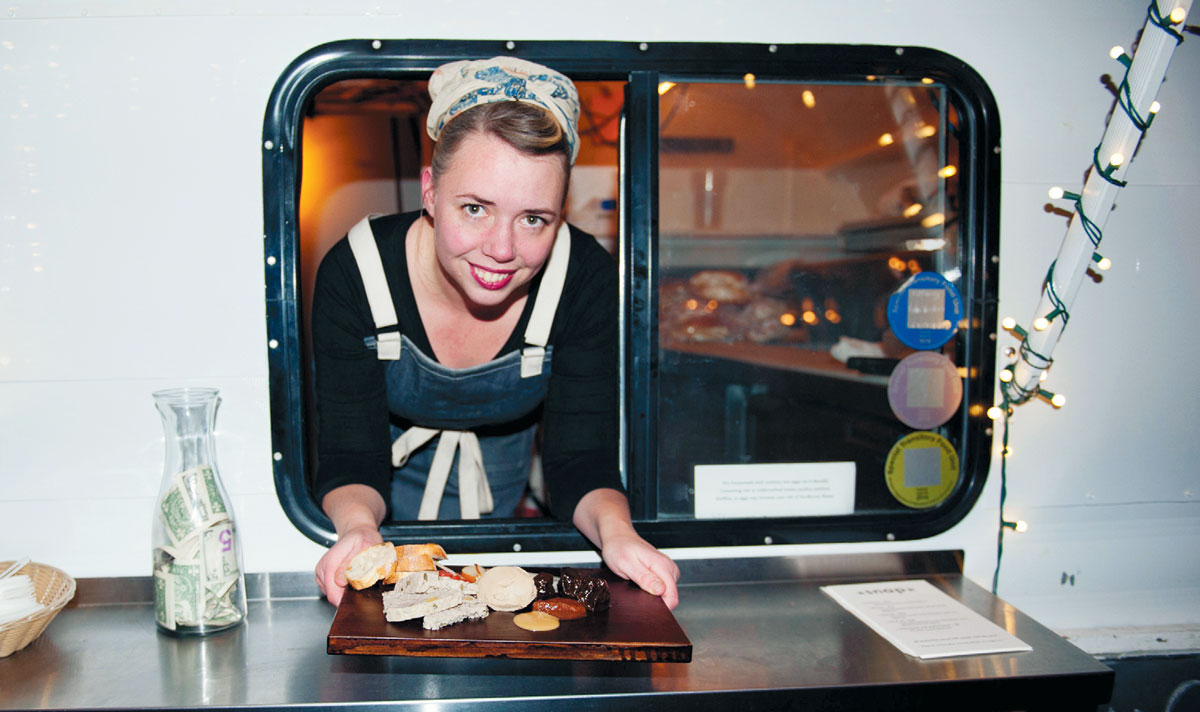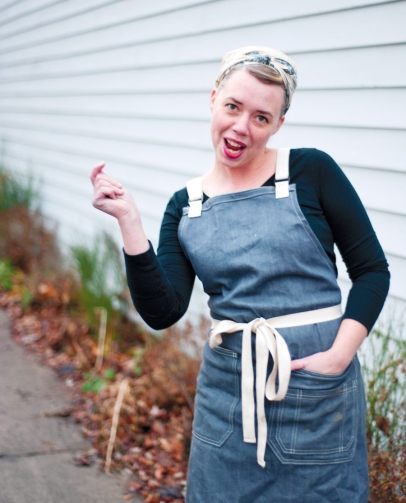Andrea Deibler, Butcher and Charcuterie Specialist
How love and respect for farm animals led a city girl to her destined calling
Growing up in Kansas City, Missouri, Andrea Deibler had a hard time with meat, and refused to eat it. Not unusual for a young person, to be sure. But how does someone with that history—especially a woman—end up being a butcher and charcuterie specialist?
Deibler’s original aversion to meat evolved because she couldn’t bear the way the animals were being raised and butchered. In the beginning, it wasn’t so much a conscious moral stand as an instinctive feeling that something wasn’t right.
“It bothered me that the animals weren’t respected,” says Deibler. “As I got older and learned more about how we as Americans buy and eat food, I became really passionate about changing our whole food system, making it more local and developing more access to farm-fresh meat from pastured animals that are raised humanely and naturally. The core of what I wanted to do—and still try to do—is to raise awareness of and support for farmers who are treating animals and the environment the way they should be treated. Of course, the need for change in our food system goes far beyond meat, but meat turned out to be my particular specialty.”
That almost didn’t happen, though. When the time came to choose an educational and career path after high school, Deibler headed to the University of Missouri Kansas City, majoring in English. She sailed through with flying colors, but discovered along the way that it wasn’t her passion. “After I graduated, I didn’t know what I wanted to do,” she says. She took a job at a coffee shop while trying to figure things out, and it was there that she had an unexpected epiphany: “I really enjoyed food service. I wanted to find out more about it and take it to a higher level—so I decided to go to culinary school.”
Deibler enrolled in the intensive three-year culinary arts program at Johnson County Community College in Overland, Kansas, right over the Missouri state line from Kansas City. “I had no interest in meat at that point. I just knew I wanted to stay in the service industry,” she says. “I like learning new skills, and I thought this would be a good way to do that.” And then the woman who later became a formidable chef reveals a most surprising fact: “Back then, I didn’t know how to cook at all—and I mean at all.”
That was about to change abruptly, however, since the college required 6,000 hours of outside restaurant work—all aspects of it— in addition to regular classes. “I first worked at a fine-dining restaurant, and then at a French restaurant. I was given the opportunity to do some butchering and charcuterie at the latter place, and as it turned out, I liked it and had a talent for it.”

FROM ONE MEAT CAPITAL TO ANOTHER
After Deibler finished culinary school, she was again at a crossroads. She was eager to learn more about whole-animal butchery (what some chefs and butchers refer to as “nose-to-tail”), but she couldn’t find anywhere in Kansas City to do it.
A good friend in Chicago convinced her to relocate there and look for a job. It turned out to be a fateful move in many ways. “Like Kansas City, Chicago is a pretty big meat town,” she says. “So I started doing my homework, researching what places and people were important in the world of butchery and charcuterie there.”
Her diligence paid off: She zeroed in on Rob Levitt, whose local, sustainable whole-animal approach to cooking matched her own. “He had gotten some press, and I just went over to his restaurant, Mado, one day and asked if I could work with him,” says Deibler. “Some press,” indeed: Chicagoist website at one point named him one of the seven best butchers in Chicago, saying, “Levitt has done more for meat in this city than anyone since Upton Sinclair, hosting demonstrations, working with farmers, speaking at conferences and evangelizing for sustainable carnivory.”
Levitt didn’t have a job to offer her, so she told him she would work for free. He agreed. “I had another job in service at the time, but I would come in on my day off and butcher with him,” she says.
Having learned the basics at Levitt’s side, Deibler was ready to move on and further hone her skills. That opportunity came in the form of City Provisions, a “hyper-local-and sustainable-centric” Chicago deli, where she was hired to head up the butchering department. In that role, she assumed responsibility for making all of the in-house charcuterie—everything from smoked ham to corned beef, pastrami, fresh sausages, pâtés and more—as well as curing salmon for lox.
Although the butchery profession has traditionally been dominated by men, Deibler says the number of women in the field is growing: “There is a tight-knit group of women butchers across the country doing some very interesting and important things.” And how is the acceptance by their male colleagues? “For me it has been great,” she says. “I have worked with many men in kitchens with no problems. For a while I worked with a butcher named Joe at Al’s Meat Market in Wilmette, a northern suburb of Chicago. He was old school, quite a traditionalist, and you might think that he wouldn’t like having a woman there, but that wasn’t the case at all. It was one of the best working relationships I’ve ever had.”
THE ROAD NORTH
During the six years she spent learning the craft of butchery in Chicago, Deibler also met and married her husband, Ben. “He was originally from Traverse City, and he brought me up here a few times on vacation,” she says. “That was my first taste of Northern Michigan, and I have to say, I was hooked. We both wanted to move here.” They did just that in May 2014.
The newly transplanted charcuterie specialist didn’t waste much time getting acclimated. As she had in Chicago, she immediately began to investigate her new surroundings and seek out like-minded individuals on the local culinary scene. “That’s what you have to do in the food business,” she says. “I think that’s where I’ve had the most success—there are always people who do things differently than you’ve done them before, and there’s always more to learn.”
With that “go out and get what you want” attitude, Deibler quickly made new acquaintances in the area, some of whom became friends. She had read about Paul Carlson at 9 Bean Rows Café in Suttons Bay, went to eat at the restaurant several times, and ended up working with him for about a year, making charcuterie, pâté and sausages and cooking on the line. “Paul has been a great supporter,” she says. It was also as a result of her local research that she emailed Cammie Buehler of Epicure Catering in Omena. “I’ve worked with her and Andy [Schudlich, co-owner] since as well, doing cooking or whatever they needed,” she says. “They are both awesome.” And she reconnected with Abra Berens, a chef she knew from Chicago who is co-owner of Bare Knuckle Farm near Northport, assisting Berens on some farm dinners.
While Deibler was working at 9 Bean Rows, she learned of an opening for a protein buyer at farm-to-table food distributor Cherry Capital Foods (CCF) in Traverse City. She went after it, and started there in February 2015. The position is a perfect fit, she says, because it combines two of her greatest passions—working with meat and working directly with and for farmers. “Also, although I work fulltime on weekdays, I have evenings and weekends free, so I can take advantage of opportunities to do other food-related projects then,” she says. One opportunity that doesn’t come up often these days is doing hands-on whole-animal butchery, so last October, when her friend Susan Odom invited her to help break down some pigs at her farm in Leelanau County, Deibler jumped at the chance. “Susan was another local food person who was on my radar, so soon after I moved here, I contacted her, and we really hit it off. That’s what I do—I call people up and say, ‘Hey, I’m coming over!’”
It almost seems that Deibler was destined to work with CCF. She had heard about Traverse City’s annual Pigstock event (“a four-day, hands-on, field-to-fork workshop dedicated to all things pig”) while she was still living in Chicago. The organizer and sponsor was Cherry Capital Foods. “I was super excited that such a thing even existed, and I signed up to attend the 2014 event even before I moved here. And just one year later, as part of my new job, I was in charge of procuring all the meat for the 2015 event!”
POP-UP CHARCUTERIE
For four weeks at the end of last year, in her spare time—which, given her busy life, seems like an anomaly—Deibler managed to run a pop-up restaurant five nights a week at the Little Fleet, a popular bar and food-truck venue in Traverse City. The venue takes one of its smallest trucks inside every winter from November to March and invites area chefs to take it over for a month as a showcase for their wares. Deibler signed on for December with *snap* (which, as any charcuterie aficionado will recognize, is a reference to the bite sensation experienced with a good sausage).
Business was brisk from the start, and her menu was a runaway hit: traditional bratwurst (with sauerkraut and mustard), Spanish-style chorizo sausage (with pickled peppers, cabbage and lime aioli), or country French-style Toulouse sausage (with braised winter greens and apple butter) served on a 9 Bean Rows bakery challah bun; banh-mi featuring country pâté and chicken liver mousse (with pickled peppers, pickled jalapeño, cilantro and aioli) served on a bunsized Pleasanton Bakery baguette; and a charcuterie board with pickles, mustard and grilled bread. Each menu item was presented with a side of colorful, tangy squash-and-kale salad. Not surprisingly, Deibler used only local meats and vegetables in her offerings. She enjoyed the food-truck venture, but has no plans to reprise it anytime soon, to the dismay of her appreciative customers.
“This [*snap*] was always meant to be just a pop-up,” she emphasizes. “It might reappear in some other form someday, so we registered the name and got a website domain, but I am ready to be done with it for now.”
So what other projects does Deibler have in the works? “I’m going to serve as a guest chef for one of the ‘Sunday Suppers’ at 9 Bean Rows café this spring, and I’ve got a couple of private catering opportunities that I might take on in the summer,” she says. “Last winter, I taught three culinary classes for NMC’s extended education program, on pâtés, chicken butchering and sausage making. I might do that again someday if I have time.”
Traverse City has been a positive experience for Deibler from the start. “People in the food business in this area have been extremely welcoming and helpful,” she says. “I’ve made so many good contacts. I feel like the chef community here is excited about new people and new ideas, and they are supportive of each other. It couldn’t be better.”
[Editor’s note: Andrea Deibler was also mentioned in EGT in articles about the Young Chefs’ dinner at Cooks’ House (Summer 2015) and Soup and Bread at Little Fleet (Holiday 2015). After popping up so frequently in the local food scene, we thought her story would be worth a closer look!]





